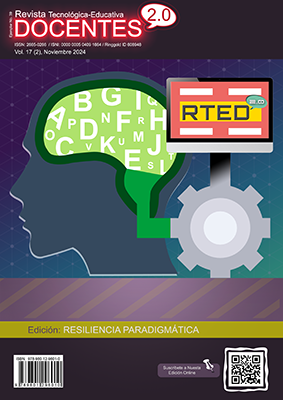Digital Inclusion Policies in Higher Education: Perspectives for Ecuador
 DOI:
https://doi.org/10.37843/rted.v17i2.564
DOI:
https://doi.org/10.37843/rted.v17i2.564
Main Article Content
Abstract
Digital inclusion in Ecuador is a central axis in the search for an equitable education. The growing integration of Information and Communication Technologies (ICT) in education has posed significant but essential challenges to guarantee digital inclusion in education. The main objective of this essay was to analyze the concept of digital inclusion and its relevance in the Ecuadorian educational field. To do so, primary sources and scientific literature were thoroughly reviewed using a qualitative interpretive approach based on the inductive method and a thematic narrative design. Based on this review, a critical analysis of the technological infrastructure was carried out, considering the Ecuadorian socioeconomic reality. The essay highlights the importance of collaboration between educational institutions, government, and the private sector to promote a more inclusive and digitalized education. This will allow the design of strategies that promote the development of digital skills, essential to face the educational challenges of the 21st century.
Downloads
Metrics
Article Details

This work is licensed under a Creative Commons Attribution-NonCommercial-NoDerivatives 4.0 International License.
Those authors who have publications in our journal accept the following terms:
- When a work is accepted for publication, the author retains rights of reproduction, distribution of his/her article for exploitation in all countries of the world in the format provided by our magazine and any other magnetic medium, optical, and digital.
- Authors will retain their copyright and guarantee the journal the right first to publish their work, which will be simultaneously subject to the Creative Commons Acknowledgment License (Attribution-NonCommercial-NoDerivatives 4.0 International (CC BY-NC-ND 4.0)). That allows third parties to copy and redistribute the material in any medium or format, under the following conditions: Acknowledgment - You must properly acknowledge authorship, provide a link to the license, and indicate if any changes have been made. You may do so in any reasonable way, but not in a way that suggests you have the licensor's endorsement or receive it for your use. NonCommercial - You may not use the material for a commercial purpose. NoDerivatives - If you remix, transform, or build from the material, you cannot broadcast the modified material. There are no additional restrictions - You cannot apply legal terms or technological measures that legally restrict you from doing what the license allows.
- Authors may adopt other non-exclusive license agreements to distribute the published version of the work (e.g., deposit it in an institutional archive or publish it in a monographic volume) provided that the initial publication in this journal is indicated.
- Authors are allowed and recommended to disseminate their work through the Internet (e.g., in institutional telematic archives, repositories, libraries, or their website), producing exciting exchanges and increasing the published work's citations.
- Request of withdrawal an article has to be done in writing by the author to the Editor, becoming effective after a written response from the Editor. For this purpose, the author or authors will send correspondence via e-mail: [email protected].
- The author will not receive financial compensation for the publication of his work.
- All Docentes 2.0 Journal publications are under the Open Journal System (OJS) platform at: https://ojs.docentes20.com/.
References
Apolo, D., Melo, M., Solano, J., & Aliaga, F. (2020). Pending Issues from Digital Inclusion in Ecuador: Challenges for Public Policies, Programs and Projects Developed and ICT-Mediated Teacher Training. Digital Education Review, 37, 130-153. https://doi.org/10.1344/der.2020.37.130-153 DOI: https://doi.org/10.1344/der.2020.37.130-153
Basantes, A., Naranjo, M., & Gallegos, M. (2020). Formación del profesorado en competencias digitales: Un reto para la educación superior ecuatoriana. Revista Iberoamericana de Educación, 84(1), 35-48. https://doi.org/10.35362/rie8413758
Cano, J., Domínguez, A., & Martínez, M. (2021). Impacto de la formación docente en competencias digitales en la educación superior: Una revisión sistemática. Revista Electrónica Educare, 25(2), 75-92. https://doi.org/10.15359/ree.25-2.5 DOI: https://doi.org/10.15359/ree.25-2.5
Concha, J. A., Choque, M. E. Q., & Choque, M. Q. (2023). Importancia del uso de las herramientas digitales en la inclusión educativa. Horizontes, 7(29), 1374-1386. https://doi.org/10.33996/revistahorizontes.v7i29.598 DOI: https://doi.org/10.33996/revistahorizontes.v7i29.598
Ministerio de Educación de Ecuador. (2021). Agenda Educativa Digital 2021-2025. Quito, Ecuador. https://n9.cl/zn4mn
Ministerio de Educación de Ecuador. (2022). Reducción de la brecha digital en el Sistema Nacional de Educación. https://n9.cl/83an0
Ministerio de Educación de Ecuador. (2023). Plan Nacional de Inclusión Digital. https://n9.cl/uskn3
Ministerio de Telecomunicaciones y de la Sociedad de la Información. (2019). Plan Nacional de Telecomunicaciones y Tecnologías de Información del Ecuador 2016-2021. https://n9.cl/hr8ma
Organización de las Naciones Unidas para la Educación, la Ciencia y la Cultura. (2021). Inclusión digital. https://n9.cl/41gfq
Paredes, W. (2021). Tecnologías para las instituciones de educación superior (IES) y sus experiencias. Una publicación de CEDIA arbitrada por el Instituto Tecnológico Universitario Rumiñahui 49(195), 13-30. https://doi.org/10.48661/CEDIA-TIC01
Ramírez, J., Samaniego, J., & Toapanta, L. (2021). Desafíos de la inclusión digital en la educación superior ecuatoriana: Brecha digital y limitaciones presupuestarias. Revista Científica Retos de la Ciencia, 5(1), 571. https://doi.org/10.53877/rc.5.1.20210101.06






